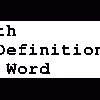To quickly follow up... we consistently attempt to derive concepts from Scripture through man's eyes without consulting God's Word for the definitions. Man is just stubborn that way. But, God has no use in speaking to soul-less entities such as trees, grass and sheep which cannot understand His Word or act upon His instruction... that is, unless these entities are Man.
This is not a concept coming forth out of man's imagination... it is spoken of and explained in Scripture and as God describes it through the writings of His Prophets. There is no other way to explain verses, such as, Amos 4:1, where God speaks to "Cows", unless we understand He is speaking to Man. And if this the exception, where is the rule?
This teaching is not solely inherent to Old Testament prophecy. Jesus, Himself, fully explains this concept in Mat. 13:37-47, as He associates many words for spiritual understanding. Considering His explanation, I believe this concept is something we cannot overlook as there is no other viable alternative. Not to mention, these definitions are all over Scripture.
Another quick example is "Grass". We think of "Grass" as something we mow in the summer, or which sheep and cattle chew on. This is the concept perceived through man's eyes, and how he typically visualizes it. But again, it should not be what we conceive "Grass" to be, but rather, what GOD explains it to be. And, here again, God describes this perfectly.
In Isaiah 40:6-7, he describes "Grass" as "Man", not once, but twice. And in 1Pet. 1:24, Peter confirms this with a nearly identical scriptural reference. To grasp this concept, literally helps to unfold Scripture as a whole, and places an entire new twist on passages such as Revelation 8:7.
In conclusion, everyone has free will to believe whatever they wish as that is how God has designed it. But if God has instructed us with His own Words and already explained it... who are we to refuse to listen, or find our own definition?
Blessings to all...























